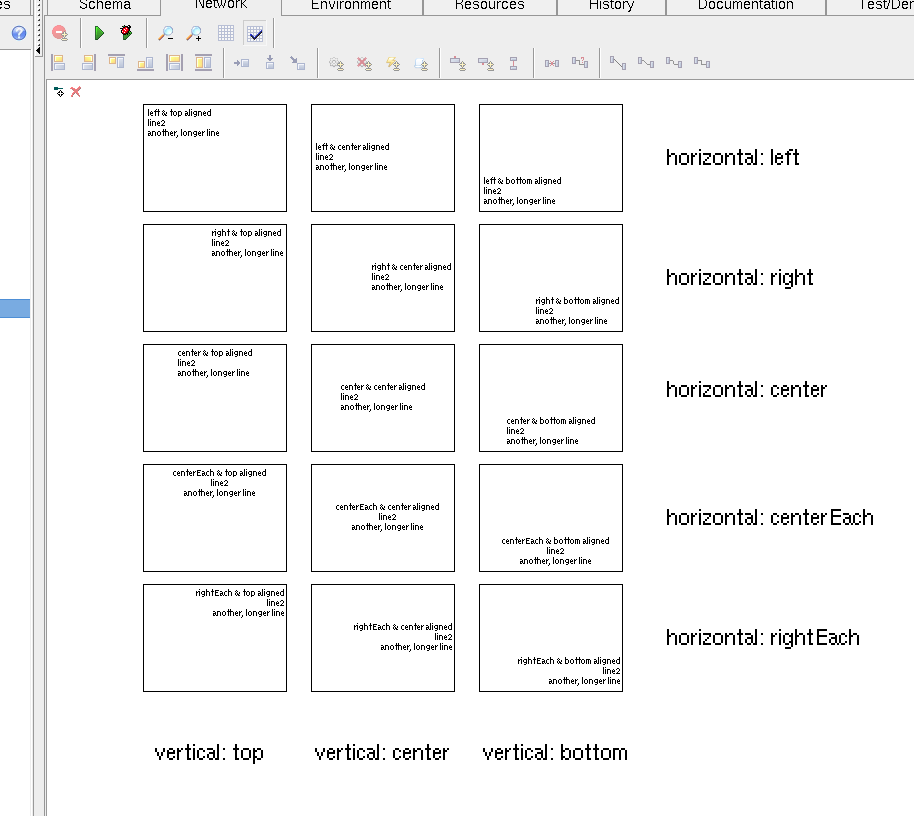DiagramElements-Annotation/en: Unterschied zwischen den Versionen
Zur Navigation springen
Zur Suche springen
Cg (Diskussion | Beiträge) |
Cg (Diskussion | Beiträge) |
||
| Zeile 53: | Zeile 53: | ||
;Background Image |
;Background Image |
||
: Choosing a background bitmap from a number of preinstalled common backgrounds. |
: Choosing a background bitmap from a number of preinstalled common backgrounds (see screenshot below). |
||
;Layer (Z-Level) |
;Layer (Z-Level) |
||
Version vom 14. Februar 2015, 20:05 Uhr
An annotation (notice) inside a Compound block's network may contain arbitrary text or images. Inside the text, certain keywords are recognized and expanded.
Keyword Replacements in Text[Bearbeiten]
- %(author)
- The name of the author (creator) of the action.
- %(creationDate)
- The creation time.
- %(modifiedBy)
- The name of the user which last modified the action.
- %(modificationDate)
- The last modification time.
- %(actionName)
- The name of the action (as shown in the project tree on the left)
- %(functionID)
- The action's functional-ID
- %(versionID)
- The action's version-ID
- %(taggedValue.xxx)
- The value of the tagged value named xxx. Tagged values are usually imported from other tools (such as when a diagram is imported from a UML tool, but can also be manually defined.
You can enter those keyword names manually or choose them from an entry in the popup menu.
Annotation Attributes[Bearbeiten]
The look of the annotation can be changed via a dialog, which is opened using the "Attributes" popup menu item:
- Textcolor
- Color of the text
- Backgroundcolor
- Color of the background. Choose "No Color" for a transparent background.
- Backgroundcolor2
- If specified, a secondary color and the background is drawn as a gradient color from backgroundColor1 to backgroundColor2.
- Framecolor
- Color of the frame. Choose "No Color" for no frame to be drawn.
- Frametype
- Style of the frame: solid, dotted, etc.
- Background Image
- Choosing a background bitmap from a number of preinstalled common backgrounds (see screenshot below).
- Layer (Z-Level)
-
- Background - the note will be covered by other elements (i.e. steps, connections etc.)
- Foreground - the note will cover other elements (useful to draw arrows or other indicators above a step, for example)
- Font
- The font used for the text
- Vertical Alignment
- Controls how the text is aligned vertically within the annotation's box (see screenshot below).
-
- top - text will be aligned from top to bottom
- center - text will be centered inside the note
- bottom - text will be aligned at the bottom
- Horizontal Alignment
- Controls how the text is aligned horizontally within the annotation's box (see screenshot below).
-
- left - text will be aligned at the left
- center - text block will be centered
- right - text block will be right-aligned
- centerEach - each line will be centered individually
- rightEach - each line will be right-aligned individually
- Default for new Notes
- If checked, the current settings will be remembered as default setting for new notes.

